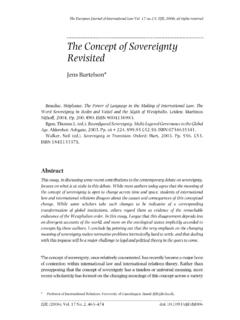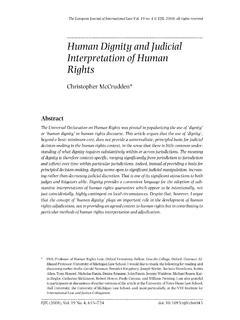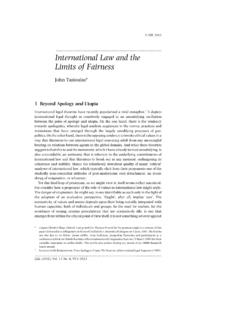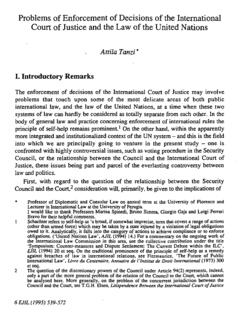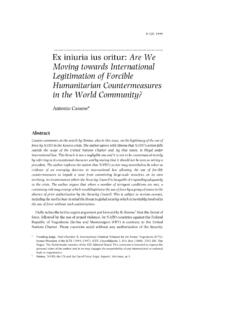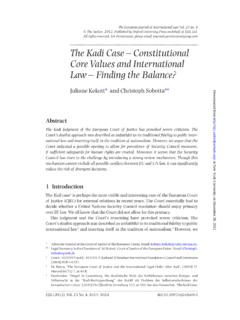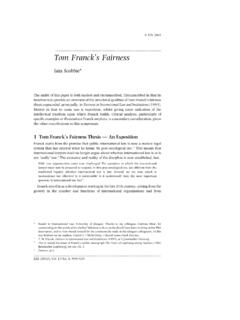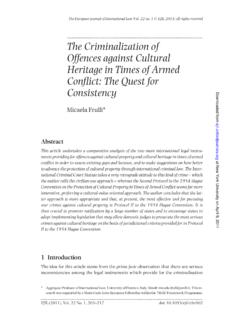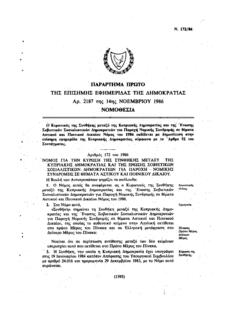Transcription of Access to Justice, Denial of Justice and International ...
1 The European Journal of International Law Vol. 20 no. 3 EJIL 2009; all rights EJIL (2009), Vol. 20 No. 3, 729 747 doi: Access to Justice , Denial of Justice and International Investment Law Francesco Francioni * Abstract The development of investment arbitration in contemporary International law has helped to consolidate Access to Justice as a principle of both customary law on the treatment of aliens and human rights law. This development has also contributed to the emancipation of individuals and private entities from the traditional institution of diplomatic protection by opening to them direct Access to International dispute settlement mechanisms.
2 At the same time, this development has raised questions whether the far-reaching penetration of foreign investment guarantees into areas of national regulation of public interest should not be counterbalanced by corresponding opportunities for Access to Justice and the availability of remedies for civil society in the host state. This article examines the relevant recent practice on this matter and argues that Access to Justice may be a unifying principle to afford protection, both at the sub-stantive and procedural levels, to investors and peoples negatively affected by the investment, both in the territory of the host state and abroad.
3 1 A Brief Historical Introduction Denial of Justice lies at the heart of the development of International law on the treat-ment of aliens and of foreign investment. At the same time this notion is inextricably linked to the broader concept of Access to Justice , understood as the individual s right to obtain the protection of the law and the availability of legal remedies before a court or other equivalent mechanism of judicial or quasi-judicial protection. Intuitively, this * Of the Board of Editors. This article is part of a larger research project on the role of human rights in International arbitration, funded by the Research Council of the European University Institute (EUI).
4 The author wishes to thank his colleagues Professors Dupuy and Petersmann for the cooperative effort in promoting this project and V. Vadi, candidate at the EUI, for her valuable research assistance on investment arbitration practice. Email: . 730 EJIL 20 (2009), 729 747 type of protection is a sine qua non for any type of constitutional democracy, where the rule of law and the independence of the courts, rather than the benevolence of the ruler, provide the fundamental guarantees of individual rights and freedoms. Yet, historically, Access to Justice has remained problematic for aliens. Even before the formation of the modern nation state, the need for a minimum degree of protec-tion of the life, security, and property of aliens established in or visiting a foreign land had emerged in the late Middle Ages, especially in the context of the fl ourishing trade between the Italian maritime Republics such as Venice and Genoa and the Mediter-ranean areas under Muslim dominion.
5 In these areas, foreign merchants coming from the Christian world could not expect the protection of the universal system of Roman law which had guaranteed the political and legal unity of the ancient Mediterranean world. On the contrary, they encountered diffi dence and marginalization by local authorities and, more fundamentally, they had to deal with the diffi culty of reconciling their need for personal and economic security with the rigid system of the personality of the law in the Islamic world. This system, informed by the close interpenetration of Islamic law and religion, was a powerful obstacle to the application of legal guarantees of contractual and property rights of non-Muslims under the lex loci.
6 1 The pragmatic response to this normative and jurisdictional mismatch was the development of special extraterritorial legal regimes for commercial establishments, trade centres, and warehouses maintained in Muslim lands ( fondaci ) by foreign mer-chants and the gradual recognition of a system of in situ protection of foreign mer-chants by agents of the foreign power of which they were nationals. 2 This practice constitutes a predecessor to the modern idea of free zones and, more importantly, formed the basis of the early development of consular relations and of the later emer-gence of that special branch of customary International law that goes under the name of minimum standard of treatment of aliens.
7 History tells us also that this early model of International protection of foreign eco-nomic interests later degenerated into forms of sheer economic dominance and of colonialism by the European Powers. The most radical manifestation of this develop-ment was the system of capitulations , an extreme form of extraterritorial imposition of foreign law and jurisdiction in the receiving state, which served to exempt their citi-zens from the sovereignty of the host state. Capitulations were gradually eliminated in the fi rst part of the 20th century and became incompatible with the principle of de-colonization later implemented within the framework of the UN Charter.
8 But the institution of consular protection remains. Thus there also remains the principle of the minimum standard of Justice to be reserved to aliens and their eco-nomic interests under customary International law. An integral part of this standard is the principle of Access to Justice . This principle presupposes that the individual who has suffered an injury in a foreign country at the hands of public authorities or of 1 On the evolution of International law in the context of the mutual contamination and cultural exchange between the Christian World and Islam see the magisterial analysis by Ago, Pluralism and the Origin of the International Community , 3 Italian Ybk Int l L (1977) 3.
9 2 L. Ferrari Bravo, Lezioni di diritto internazionale (1993), at 25. Access to Justice , Denial of Justice and International Investment Law 731 private entities must be afforded the opportunity to obtain redress before a court of law or appropriate administrative agency. Only when Justice is not delivered, either because judicial remedies are not available or the administration of Justice is so inad-equate, defi cient, or deceptively manipulated as to deprive the injured alien of effective remedial process, can the alien invoke Denial of Justice : a wrongful act for which International responsibility may arise and in relation to which an interstate claim and diplomatic protection may be made by the national state of the victim.
10 So, in its historical evolution, Access to Justice is inseparable from the minimum standard of treatment of aliens . This is confi rmed by the customary rule requiring prior exhaustion of local remedies as a precondition of diplomatic protection. This rule presupposes the International obligation of every state to ensure Access to courts to aliens and to administer Justice in accordance with minimum standards of fairness and due process. However, the principle of Access to Justice , as an integral part of customary inter-national law on the treatment of aliens, guarantees only Access to remedial process within the territory and under the law of the host state.
